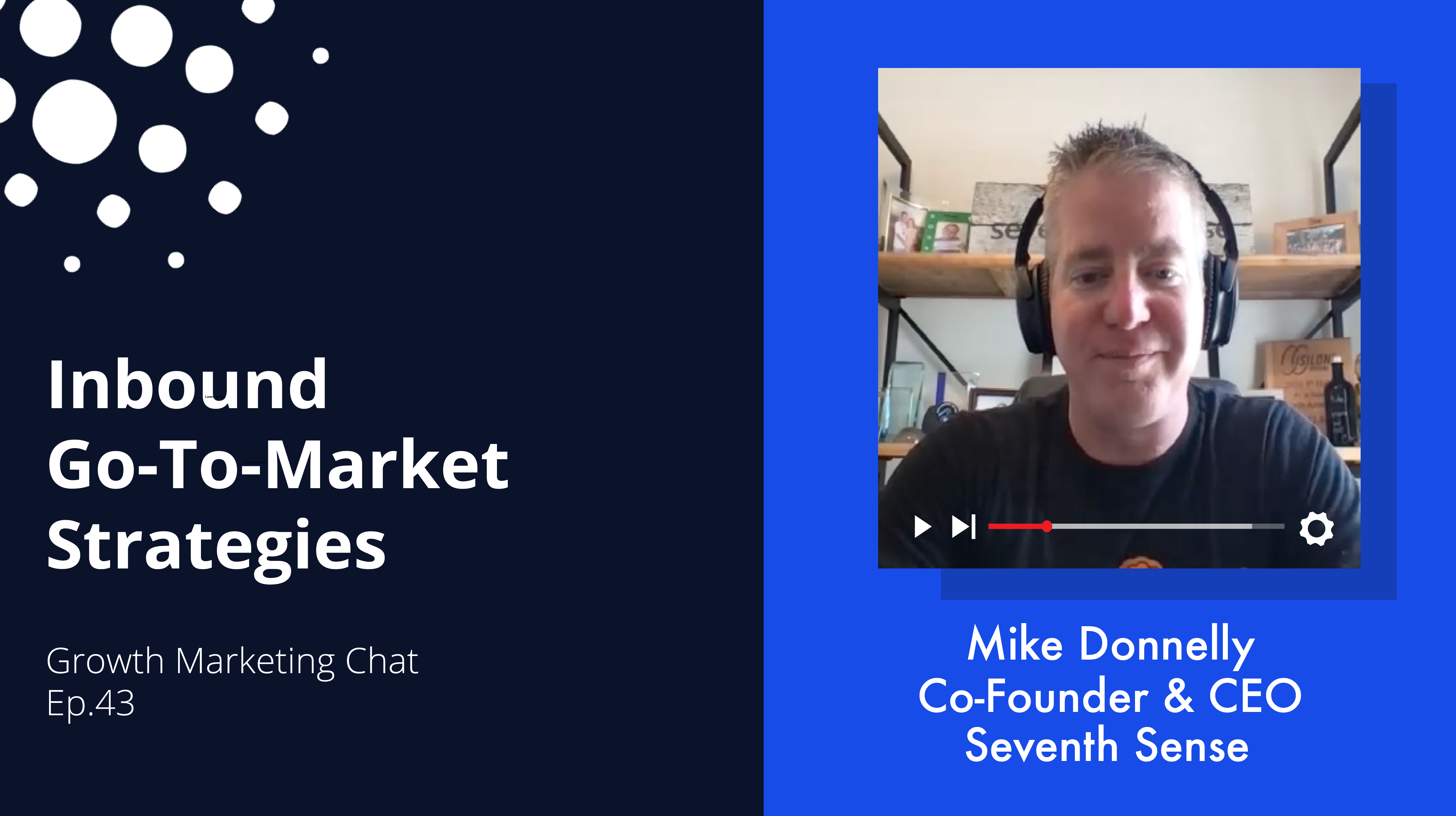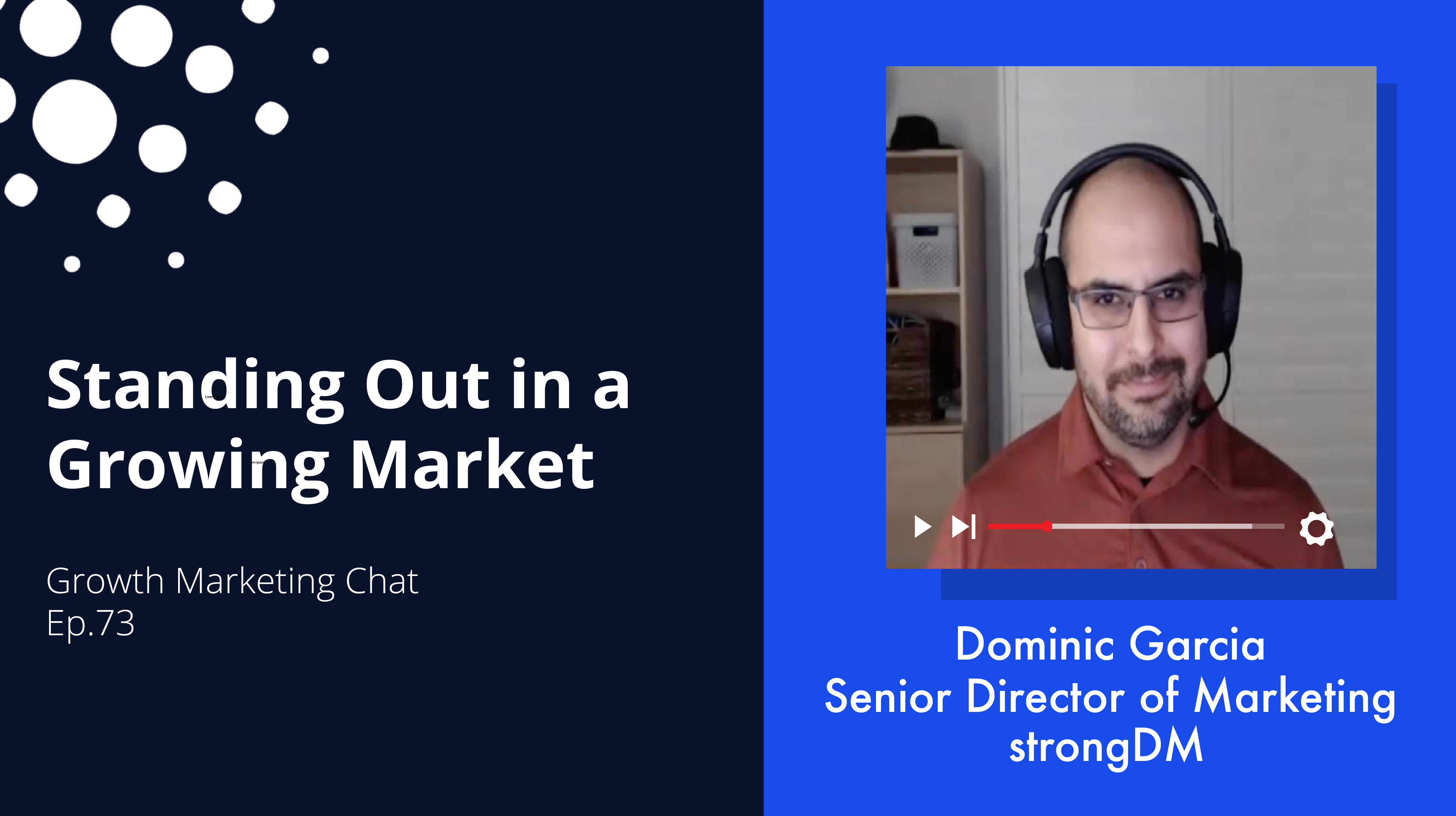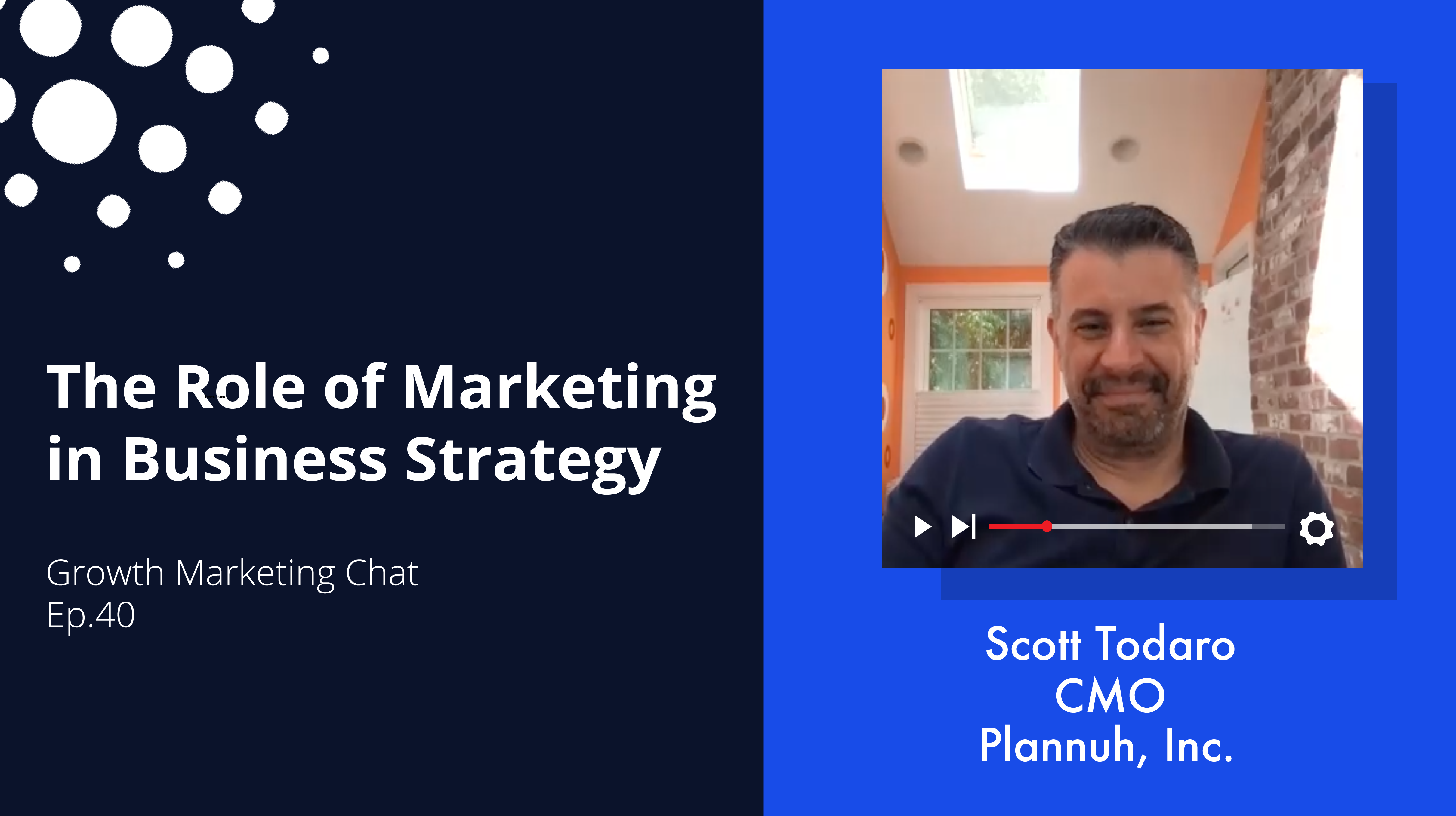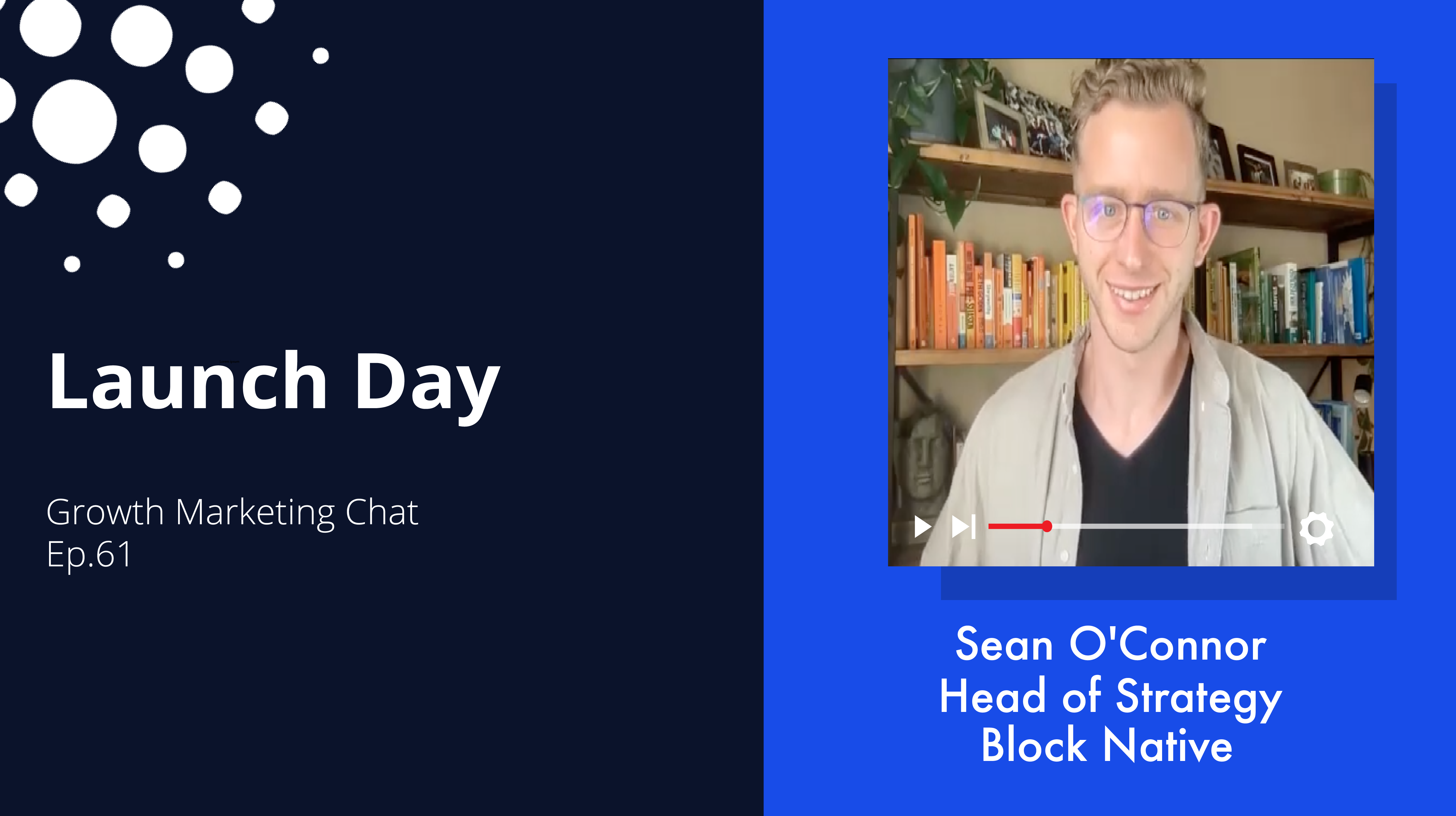Think of a celebrity who’s used their name, popularity, and following to successfully monetize a product. Building a strong and engaged following might seem like a piece of cake for Hollywood stars, but your company can and should do the same.
By making sure your growth marketing strategy focuses on attracting people who will stay loyal and engaged, no matter what your product is, you’re setting your business and yourself up for success.
Positive brand affinity can lead to revenue growth and help make marketing a long-term investment that becomes a profit generator. In growth marketing, the people matter just as much as the product.
“...If you think, ‘I am going to create marketing that is so valuable to my audience that they'd be willing to pay to gain access to it, to subscribe,’ that forces you to create amazing marketing content that is naturally also going to result in pipeline for you.”
How to Keep Your Audience Coming Back for More
In this week’s Growth Marketing Chat episode, Kathleen Booth, VP of Marketing at clean.io shares the marketing revelation she had while replacing her front door. She reveals:
- How to build a strong and engaged audience (and why it matters)
- The importance of making marketing into a profit center
- Why you should see marketing as a long-term investment
- The importance of self-awareness and personal growth
A strong growth marketing strategy will remember that in some ways, the audience itself is the product, and making sure you sell them is a surefire way to drive revenue.
Watch the full interview for more expert advice on how to build a habit with your audience and keep them coming back.
Video Transcript:
CAROLINE: Hi, welcome to Growth Marketing Chat today. I'm here with Kathleen Booth. She's the vice president of marketing at Clean.IO and we're really lucky to have her here with us today. Kathleen, thank you for being with me.
KATHLEEN: Thank you for having me on the show, Caroline.
CAROLINE: So, I always like to ask my guests what they wanted to do when they were a kid, what they wanted to do? When they grew up, so... So, what was your dream as a kid?
KATHLEEN: Oh, so when I was really little, I wanted to be a famous actress, but as I then transitioned into, I think, middle and high school, I became very much like a social activist, and I wanted to change the world, and actually it was around the time that apartheid was a thing in South Africa. And, so it led me to then go to college and study political science in the hopes of making the world a better place for everybody.
CAROLINE: Got it. And, so what led you to marketing?
KATHLEEN: So, I did go to college for political science, as I mentioned, and I started doing a graduate degree in international politics, and about halfway through that, the school that I was at, which was George Washington University, and in Washington DC, allowed existing graduate students to do a second degree without having to reapply, 'cause they would look at your existing track record. And, so I, at the time, just remember thinking I need a degree that's gonna make it easier to find a job. And, so I did an MBA and I happened to concentrate in marketing in my MBA, and that eventually led me to start my agency, and pursue a career in marketing.
CAROLINE: Awesome, awesome. So, when we started to chat, you sent me a video and I had this amazing revelation that you can learn about marketing while trying to replace your front door. And, it was a fantastic story and I would love to hear it again.
KATHLEEN: Sure. So, I... Self can admittedly kind of addicted to HGTV, and I think it started when I was having my son, and I was stuck at home nursing my baby, and I just would sit and watch TV while I did that. And, I didn't want to watch soap operas or anything like that. And, so I watched HGTV and I think the cooking channel and in more recent years, one of the shows that I've really enjoyed was Fixer Upper with Chip and Joanna Gaines. And, I remember I would watch it and it would just make me look around my own house and think, oh, my gosh, there's so much I want to change, right?
I would start to see everything in a new way. And, eventually I got my husband watching it with me. And, one of the things that I fixated on was our front door at the time, which I did not like, and it was kind of cracked and needed replacing. And, so these shows make it look like you can just replace everything in a few minutes and it takes no time. And, I came up with this idea. We could go to the architectural salvage place and do it ourselves, which we did, but it, long story short, it turned into a big nightmare. It all ended well, because we have a front door that I love, but it was a lot more time-consuming, and really hard work, and more expensive than I thought. But, it kind of, was the tipping-off point to me recognizing that my interest in Fixer Upper had transitioned into something else. And, like I started noticing when I would go to Target and I would see the Magnolia home store there, which is Chip and Joanna Gaines' store in Target that I would want to buy things at it. And, I would see her magazine on the shelf at a store and I'd want to read it. And, I became more interested in, they started a paint line, and they started selling a line of rugs, and I was following all of this and realizing, wow, this is the opposite of how we usually think about marketing.
In the sense that, traditionally, with marketing, we have a product, and then we try to go find an audience and sell to it. And, what, in this case, Chip and Joanna Gaines did, but there's lots of examples of people doing it and companies doing it, is they found an audience, and then they went and sold products to that audience, which is so that it flips everything on its head. And, it's really what media companies have always done, where they build the audience. And, in some senses, the audience itself is the product, but it's also a potential avenue for monetization. And, so, if you're able to build a large audience that is highly engaged, that really has a strong brand affinity, then you have really built a platform onto which you can sell almost anything, as long as it's related to that audience.
And, a great example of that is Gwyneth Paltrow and Goop. She started out as a blogger and now she is an e-commerce behemoth who sells lots of different types of products to her audience, which is just ready and willing to gobble it up.
CAROLINE: Yeah, yeah, yeah. And, it's really powerful to think of it this way. And, once you start thinking about it, it's like I had like 10 examples pop up in my head that I'm like, oh, and now I buy all these things from like... I have all the Jamie Oliver cookbooks, because one day I got up in the morning and I found Jamie Oliver's Italy on TV. And, I fell in love with it. And, then just bought all the Jamie Oliver cookbooks and like that, tons and tons of examples like this. It's so powerful.
KATHLEEN: Yeah, and there are more... Certainly, there are a lot of examples along those lines of people who began as influencers and then created businesses around their audiences. But, there are also now some more interesting examples cropping up of businesses that are seeing this, and it doesn't necessarily have to happen chronologically, where you have the audience and then you sell the product, right? But, that you get the concept behind it. But, if you look at what's happened in recent years with, for example, HubSpot acquiring the Hustle newsletter.
The Hustle literally just started as a newsletter. And, it is a newsletter first business model and HubSpot recognized that if it wanted to continue to grow at the pace that it had, it needed a bigger audience. And, it needed really, almost a media like audience, that was coming back to it every day or every week, for information, not just when the person needed a marketing automation platform or a CRM. And, it was a bigger... It's a much bigger community play. And, then you have a venture capital firm like Andreessen Horowitz, which is creating a separate business unit, that's just a media business. And, there are so many more examples like this... And, growing.
CAROLINE: Yeah, yeah, yeah. Another one that comes to mind is the Motley Fool. They have... You're right. It's not just content, right? It is a media company. They think about their content as media and it makes all the difference.
KATHLEEN: Yeah, and at the heart of it, the goal is really to do the same thing that a traditional publisher does, which is to build a habit with your audience, to get them to make your media a part of their daily or weekly life, to keep coming back to you, and in doing so, what you're doing is building a platform that you could eventually monetize. A lot of these companies monetize their marketing by selling native content sponsorships or newsletter sponsorships or creating events that they charge for. So, there's the possibility of making marketing into a profit center, which is pretty mind-blowing when you think about it.
Because, as marketers, our budgets are always under attack. But, if we can say we're a profit center, all of a sudden you're creating a springboard from which to add budget, not have it taken away, but it's also just really a way to stay top of mind all of the time, regardless of whether your audience currently has a need or not. And, when you're staying top of mind, you create a platform for people to refer you, to generate and stimulate demand where perhaps it wasn't in the first place. And, so there are a lot of possibilities there.
CAROLINE: Yeah, yeah. And, something that is really fascinating to me is that a lot of the time, when people think about brand and creating brand content, they think about cost. And, they think about vanity metrics and that type of stuff, right? And, what you're saying is it's totally the opposite, right? It's transforming marketing into a profit center through this, not only brand, but in sorts leadership and media building.
KATHLEEN: Yeah, in fact, I was just listening to a conversation of marketers that I think is really relevant to this conversation that you and I are having, which is that lots of marketers talk about their budget as spend or budget. And, really, what we're talking about is thinking of marketing as an investment, in building out a long-term asset. And, if you're approaching marketing in the traditional way, it really is spend in budget, because it's short-term. It's we will invest in this channel, or not, I shouldn't even say invest. We will spend on this channel.
We expect to see this in return, right? And, that's why we get in this hamster wheel of always having to prove that we're getting these leads, or we're contributing to pipeline in this way. And we're... That's important, but what I'm suggesting is a longer-term perspective, where if you look at marketing as an investment in building a... Your own audience, not having to rely on somebody else's audience like Facebook, or Google, or any other rented platform, LinkedIn. But, if you build your own audience, that really is coming back to you proactively, that is subscribing to your email newsletter, that is coming to your events, that is joining the community you've built.
That is an asset with value that others would be willing to gain access to. That is an asset that investors value. There's a company called Freight Waves, that is a perfect example of this. It is literally in the freight space, which is one of the least sexy industries out there. And, they do provide data to the freight space, but at the same time, they started very early investing in building out a media platform where they have almost like an odd digital publication, and newsletters, and they have events, and they've monetized all of it, and they've developed a huge following, because they filled a niche that nobody else was paying attention to. And, they just got a new round of venture capital and their evaluation was enormous. And, the investors talked about how one reason that they invested and gave it that level of valuation was because they saw the income that was coming in, basically through their media arm, through their marketing, and recognized that as having value in and of itself, apart from the core product the company sells.
CAROLINE: So, really it's thinking about marketing just as you would think about your product, right? When you develop your product, you're not like, well, is this feature gonna bring me money tomorrow, right? You think about is it gonna be called a cohesive, valuable, game-changing product that delivers value to my audience in the longterm.
KATHLEEN: Exactly right. Yes, you think, if I'm able to create something that delivers tremendous value to the audience, then pipeline will naturally follow, the sum of the parts is greater than each individual part. And, it's this... You're right, it's the same with marketing, if you... I think unfortunately, a lot of marketers think of it as I am going to create marketing content in service of driving pipeline, which is a very transactional approach, very short term. Whereas, if you think I am going to create marketing, that is so valuable to my audience, that they'd be willing to pay to gain access to it, to subscribe, that forces you to create amazing marketing content that is naturally also going to result in pipeline for you. And, you could build all of your traditional funnels on top of that, but that, that is future-proofing your marketing. And, then it doesn't matter whether there's a Google algorithm change or Facebook ads platform change, you will not be affected in the same way you would be if you were taking that short-term approach.
CAROLINE: Yeah, yeah, yeah. And, in content, you really see that, right? The Google algorithm cares about tiny, little things. But, then at the end of the day, if you're delivering really good, powerful value to your audience, they are gonna keep coming back.
KATHLEEN: Yeah, and in fact, Google does change its algorithm all the time, but actually what Google is optimizing for is delivering value to the end user. And, so that's the other thing I think marketers do wrong is they obsess over the items in the algorithm, when in reality, what the algorithm is obsessing over is solving for the end user. And, so if you just forget the algorithm and try to solve for the end user, if you align yourself with the goal of the algorithm itself, you don't have to worry about the details as much. It'll take care of itself. And, you also, you don't have to worry about algorithm changes, because if you're optimizing for the same thing it is, you will have... You'll be 10 steps ahead of it.
CAROLINE: Yeah, yeah, yeah. It's like, don't have a slow site, because your users won't like a slow site, not because of Google. Your users will hate it, right? Alright, well, that was so great. I guess my last question to wrap up is what are some of the most valuable lessons you've learned in your career?
KATHLEEN: Oh, my goodness. This is such a hard one to answer, because it's like trying to pick your favorite child. There are so many, and they're also different from one another. Like, I think I'm somebody who has a bias for action. And, so I think the biggest thing of all is learning to understand myself more deeply and doing... Like I've done a lot of those personality tests, whether it's... What's the word. Oh, my goodness. Ah, Myers-Briggs or... Yeah, all those types of tests, learn a disc. That's the one I was trying to search for, doing a disc and learning I'm a high D, right? Becoming super self aware about what my strengths are and my weaknesses are, and learning to try and recognize that, and recognize when my behavior is helping versus hurting in certain situation. I think that's so much more powerful than any individual marketing lesson learned or anything else that I could share. It's just becoming as self-aware as I can be and always looking to grow and improve.
CAROLINE: Yeah, that's a really good one. Great, well, Kathleen, thank you so much for joining today. I really enjoyed this chat and hopefully, our audience will enjoy it too.
KATHLEEN: This was so much fun. Thank you so much for having me.





